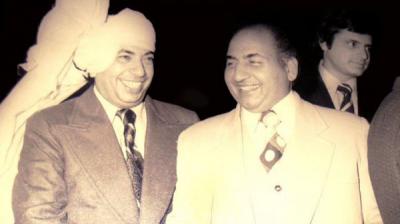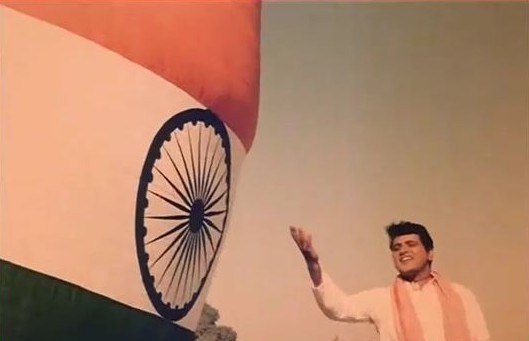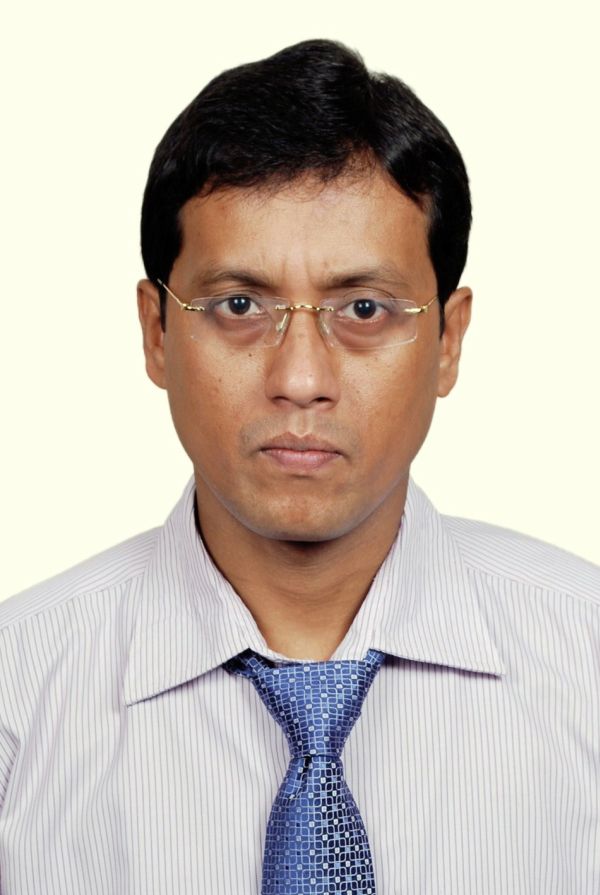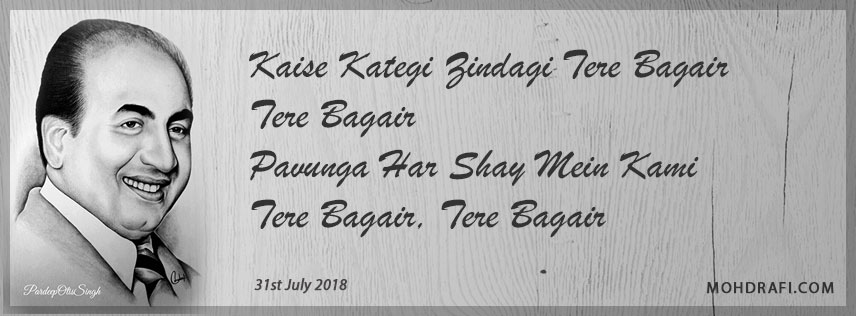Mahendra Kapoor: The Vibrant Voice of India
This article is compiled by MR. BIMAN BARUAH, Gokuldham ONGC Colony, Goregaon(E), Mumbai-400063

Mohd Rafi and Mahendra Kapoor
On 15th August, 2013 we celebrated INDIA’s 66th Independence Day with most famous celluloid patriotic song like “Jahan Daal Daal Par Sone Ki Chidiya Karti Hai Bassera, Woh Bharat Desh Hai Mera” sung by golden voice of Mohammed Rafi. The song describes the exclusive and well-heeled natural, cultural, social characteristics of our country. The song was written by Qamar Jalalabadi and composed by Hansraj Behl from SIKANDAR-E-AZAM (1965) based on the story of Alexander and Puru.
Patriotic songs express natural love and affections for one’s country, culture and homeland. Hindi Film and Hindi Film Music have played an important role in encouraging the feelings of nationalism among the citizens of the country. Patriotism and Hindi Film Music have merged together in countless melodies. The songs united all Indians in patriotic commitment even though the multiplicity. As a secular country INDIA is best known in the world for its patriotism or national integration and where the great patriotic leaders like Maha Manab Mahatma Gandhi, Pandit Jawaharlal Nehru, Netaji Subash Chandra Bose, Lokmanya Tilak, Shaheed Bhagat Singh, etc. were born who scarified their life for freedom of the country.
 In 1948, Mohammed Rafi Saheb became famous for real life patriotic singing with the song, “Suno Suno Aye Duniya Waaloon Bapuji Ki Amar Kahini” after Mahtma Gandhi was gun down. The song was written by Rajendra Krishan and composed by Husanlal Bhagatram. In the same year, he also started reel life patriotic singing with the song, “Watan Ki Raah Mein Watan Ke Naujawan Shaheed Ho” from SHAHEED (1948). The song was written by Qamar Jalalabadi and composed by Ghulam Haider. Rafi Saheb got a silver medal from Prime Minister, Jawaharlal Nehru on the Indian Independence Day in 1948. The songs did not lose their plea of patriotism even after 65 years due to poignant singing. Mohammed Rafi lent his golden voice for most of the inspiring patriotic songs of Hindi Film Music in the films like JAGRITI (1954), NAYA DAUR(1957), PHOOL BANE ANGAARE (1963), HAQEEAT (1964), LEADER (1964), SHAHEED(1965), AAKHEN(1968), LALKAAR (1972),HINDUSTHAN KI KASAM (1973), BADLA AUR BALIDAN(1980) and DEAS PREMEE (1981).
In 1948, Mohammed Rafi Saheb became famous for real life patriotic singing with the song, “Suno Suno Aye Duniya Waaloon Bapuji Ki Amar Kahini” after Mahtma Gandhi was gun down. The song was written by Rajendra Krishan and composed by Husanlal Bhagatram. In the same year, he also started reel life patriotic singing with the song, “Watan Ki Raah Mein Watan Ke Naujawan Shaheed Ho” from SHAHEED (1948). The song was written by Qamar Jalalabadi and composed by Ghulam Haider. Rafi Saheb got a silver medal from Prime Minister, Jawaharlal Nehru on the Indian Independence Day in 1948. The songs did not lose their plea of patriotism even after 65 years due to poignant singing. Mohammed Rafi lent his golden voice for most of the inspiring patriotic songs of Hindi Film Music in the films like JAGRITI (1954), NAYA DAUR(1957), PHOOL BANE ANGAARE (1963), HAQEEAT (1964), LEADER (1964), SHAHEED(1965), AAKHEN(1968), LALKAAR (1972),HINDUSTHAN KI KASAM (1973), BADLA AUR BALIDAN(1980) and DEAS PREMEE (1981).
 In film Shaheed (1965), Rafi Sahab sung three solos, “Ai Watan Ai Watan Humko Teri Kasam” “Pagadi Sambhaal Jattaa”, “Watan Pe Marne Wale Zinda Rahega Tera Naam” and a chorus “Sarfaroshi Ki Tamanna Ab Hamari Dil Mein Hain” with Manna Dey & Rajendra Mehta. Mahendra Kapoor sung a chorus “O Mera Rang De Basanti Chola” with Mukesh, Lata Mangeshkar and Rajendra Mehta. The music of the film composed by Prem Dhawan and songs written by Ram Prasad Bismil became big hit due to flavour of patriotism.
In film Shaheed (1965), Rafi Sahab sung three solos, “Ai Watan Ai Watan Humko Teri Kasam” “Pagadi Sambhaal Jattaa”, “Watan Pe Marne Wale Zinda Rahega Tera Naam” and a chorus “Sarfaroshi Ki Tamanna Ab Hamari Dil Mein Hain” with Manna Dey & Rajendra Mehta. Mahendra Kapoor sung a chorus “O Mera Rang De Basanti Chola” with Mukesh, Lata Mangeshkar and Rajendra Mehta. The music of the film composed by Prem Dhawan and songs written by Ram Prasad Bismil became big hit due to flavour of patriotism.
There are several singers inspired by singing style of singing God, Mohammed Rafi from Mahendra Kapoor to Sonu Nigam. The list is endless, such as Yesu Das, S.P. Balasubramanium, Anwar Hussain, Mohd. Aziz, Shabbir Kumar.

Mahendra Kapoor, the first ever singer inspired by Mohammed Rafi, is famous for rendering of the most of patriotic songs picturised on the actor Manoj Kumar for which the actor felicitated the title of Mr. Bharat or Bharat Kumar and his brand of patriotism started from film SHAHEED (1965) with voice of Rafi. Manoj Kumar’s most famous patriotic song, “Meri Desh Ki Dharti, Sona Ugle , Ugle Heere Moti” was originally to be reordered in the voice of Rafi Sahab. But Rafi Sahab was out of city, Manoj Kumar called Mahendra Kapoor for early completion of recording for his film UPKAAR. Mahendra Kapoor won the National Film Award for Best Male Playback Singer for the song in 1968 and became famous as patriotic singer or voice of Manoj Kumar . His other notable patriotic songs are: “Na Moonh Chhupa Ke Jiyo” from HUMRAAZ, “Bharat Ka Rehnewala Hoon” from PURAB AUR PASCHIM, “Woh Kaun Hai Jo Maa Ki Tarah Booj Uthayee Palkoo Mein Bethayee, Yehi Dharti Yehi Dharti” from GAANWAR, “Aandhi Aaye Ki Toofan Koyee Gam Nahin” from SAAT HINDUSTANI, “Aur Nahin Bas Aur Nahin” from ROTI KAPADA AUR MAKAAN and “Ab Ke Baras Tujhe Dharti Ke Rani” & “Kranti Kranti” from KRANTI.
Later stage, he also became highly popular as devotional singer too with songs like “Yahan Wahan Jaha Taha Mat Pochoo Kaha Kaha” from JAI SANTOSHI MAA and “Durga Hai Meri Maa, Ambee Hai Meri Maa” from KRANTI.
Mahendra Kapoor was born in Amritsar, Punjab on 9th January, 1934. Teenage Kapoor was inspired by singing God Mohammed Rafi and soon he moved to Mumbai to start his singing career. At the beginning of his career, he won the all-India singing competition in the late 1950s at All India Youth Festival. He got his first break in Mumbai with director Raja Nawathe’s SOHNI MAHIWAL (1958) under composer Naushad Ali for a background number “Chaand Chuppa Aur Taree Dooba”, but the film had no impact in his singing career. Then music director C. Ramchandra popularly known Chitalkar as a singer hired him to sing the duet song “Aadha Hai Chandrama, Raat Aadhi, Rehna Jaiyee Teri Meri Baat Aadhi, Mulakath Aadhi” in V. Shantaram’s film NAVRANG (1959). The song picturised on Mahipal and Sandhya was a big hit and Kapoor got glare of publicity.
He was mainly recognised as major playback voice of Manoj Kumar after Mukesh. In addition to Manoj Kumar, he also playback for large number of actors from Dilip Kumar to Raaj Babbar. He lent his melodious voice for Dilip Kumar (GOPI, BAIRAAG, SHAKTI), Raaj Kumar (HUMRAAZ, DESH KA DUSHMAN), Sunil Dutt (GUMRAH, WAQT, HUMRAAZ), Rajendra Kumar (DHOOL KA PHOOL, SANGAM, GEET, GANWAR), Shashi Kapoor (DHARAMPUTRA, MEHNDI LAGI MERE HAATH, WAQT), Joy Mukherjee (DIL AUR MOHABBAT, PURASHKAR), Biswajeet ( SAGAAI, KISMAT), Dharmendra (KAAJAL, BAHAREE PHIR BHI AAYEGI, JAB YAAD KISI KI AATA HAI, AYE DIN BAHAR KE ), Jeetendra (GEET GAYA PATTARON NE, NAGIN ), Rajesh Khanna (BANDISH, AVTAAR), Feroz Khan (AURAT, CID NO.999), Vinod Khanna (HEERA PHERI, AMAR AKBAAR ANTHONY, MOQADAAR KA SIKANDER),) and Raaj Babbar (AAJ KI AWAAZ, NIKAAH ). His songs like, “Tere Pyar Ka Aasra Chahta Hoon”, “Nele Gagan Ke Tale, Dharti Ka Pyar Pale”, “Kisi Pathar Ki Moorat Se Mohabbat Ka Irada Hai”, “Badal Jaye Agar Mali Chaman Hota Nahin Khali”, “Lakhon Hai Yahan Dilwale, Par Pyar Nahin Milta”, “Sun Sun Iktara Bole”, “Hey Gentleman Gentleman Gentleman, London Se Aaya Main Gentlemen”, “Fakira Chal Chala Chal” and “Ab Ke Baras Tujhe Dharti Ke Rani Dhardenge” are still very popular.
As a playback singer, Mahendra Kapoor was among the handful of singers who dominated the golden age of Hindi Film Music. He had a soft harmonious voice after Rafi Sahab and made maximum male playbacks in Hindi Films from 1963 to 1970 next to Rafi Sahab till rising of Kishore Kumar. He was a diehard fan of Mohammed Rafi and his singing style was quite similar to Rafi Sahab whom he considered as his GURU. If Rafi Sahab got preference over other singers, Kapoor felt no resentment as he was a devoted fan of Rafi Sahab, who openly admits “I adore Rafi”. Thus, he was the real “Shagird” of Mohammed Rafi. His relationship with Mohammed Rafi became very cavernous in initial stage and they decided not to come into competition. Rafi Sahab said “Public will toss us against each other, but we are brothers, not opponents”. Renowned Producer-Director B.R. Chopra wanted to record a duet with voice of Rafi Sahab and Mahendra Kapoor in early 1960s for a film which create some undisclosed difference between Rafi Sahab and B.R. Chopra. From then Rafi Sahab keep distance from B.R. Films though he always preferred singer of composer RAVI which benefited Mahendra Kapoor a lot. Thus, there was no duet sung by them except the duet,“Kaisi Haseen Aaj Baharon Ki Raat” from the film AADMI (1968) which was originally recorded in the voice of Mohammed Rafi for Dilip Kumar and Talat Mehmood for Manoj Kumar. After music release of the film, it was observed that the voice of Talat Sahab is not able to match the Rafi Sahab’s voice to express the fight between the lead actors, since Talat Sahab was not well at that time. Actor Manoj Kumar insisted director A. Bhim Singh and composer Naushad Ali to replace Talat Mehmood with Mahendra Kapoor. Mahendra Kapoor agreed for it with due permission from both Talat Sahab & Rafi Sahab and Naushad Sahab re-recorded the song. The song was not yet released by SAREGAMA-HMV in form of Record / Cassette / CD and remains only in the film.
He also sang many hit songs for B.R.Films (Dhool Ka Phool, Gumrah, Waqt, Hamraaz & Dhund ) composed by music director RAVI. He was a favourite singer of producer-director B.R. Chopra and sang many notable songs in his films. He also sang the title song of Chopra’s popular TV Serial “Mahabharat” in the late 1980s. He sung about 2,500 songs including different regional languages and was active from 1956 to 1999. In 1980, Mahendra Kapoor started singing for regional films, mainly in Punjabi, Bhojpuri and Marathi. He is best known in the Marathi films as a permanent voice of Marathi actor Dada Kondke in all his films. He was also pioneer in conducting the popular reality Antakshari programmes in Television with his son actor turned anchor Rohan Kapoor who acted in a few films in the 1980s, i.e. Yash Chopra’s FAASLE (1985), LOVE 86 (1986) and IMAANDAR (1987).
In addition to National Award in UPKAR, he also won Filmfare Best Male Playback Award three times, for “Chalo Ek Bar Phirse, Ajnabi Baan Jayee Hum Dono” in GUMRAH (1963), for “Neele Gagan Ke Tale, Dharti Ke Pyar Pale” in HUMRAAZ (1967) and for “Nahin Nahin Bus Aur Nahin” in ROTI KAPDA AUR MAKAN (1974). Government of India honoured him by Padmashree in 1972, the India’s highest civilian award and Maharashtra Government had honoured him with Lata Mangeshkar Award for his lifetime contribution in playback singing.
Mahendra Kapoor was passed away at 74, on 27th September, 2008 at his Bandra residence in Mumbai due to cardiac failure. In a condolence message, then President Pratibha Patil remarked “Kapoor delighted millions of Indians by his voice”. Thus, he will always be remembered as “The Vibrant Voice of India” for his matchless patriotic singing and no Independence Day & Republic Day will be celebrated without playing his songs.
The signpost patriotic songs of Mohammed Rafi and Mahendra Kapoor are being everlasting, still very popular in All India Radio and National TV Channels and also have the sense of hearing in all the corners of the country during the Independence Day, Republic Day and any other public functions. The songs facilitate in inspiring the pure feelings of nationalism or national integration whenever we hear them.
















dear friends, i am looking for a cassette cover should be entitled “Aye Mere Watan ke Logon.” Kindly contact if you have the cassette with printed cover or any information.. vj.nawaria@gmail.com
Dear Rafians,
It is a fact that Rafi Saab is the only singer in the world who
had done playback for three generations i.e.for Pritviraaj
Kapoor,Raj Kapoor and Rishi Kapoor.
There is a song from the film “Inkaar” music given by
Rajesh Roshan and rendered by Rafi Saab is suitable
for the 4th generation of Kapoor family Ranbir Kapoor
and if any producer included this song for him it will
be a very interesting thing.The song is “Dhil ki kalee
yu hi sadhaa……”
Dear bimanji,
thanks a lot for the article.it increases our knowledge for our boleved god of singing.as we all know very well that mahendra kapoorji respected always rafisaheb by calling him as his ‘GURU’.ALSO he got his “shikhsha” of singing from rafisaheb as ‘” SHAGRID””.
And perhaps m.kapoor would have never known that how many songs he had got with recommendation of rafisaheb.
few of few persons know that rafisheb, simply a noblest person,acted as a real wellwisher secretly for his SHAGRID.as it was his nature
mohd Rafi song In film Johar in Kashmir is one of the best patriotic songs “Kashmir hai Bharat” O P N tried to replace mohd Rafi using MK and KK but it not worked opn backed to mohd rafi….
I couldn’t agree more Kutty sir as Sonu Nigham’s version of the songs originally sung by Mohd Rafi are definitely inferior and I personally prefer to stay well clear of them. Why have cotton when you can have silk? and that’s exactly what I associate with Mohd Rafi is his beautiful silky smooth voice and no one can ever compete with that.
Dear Bimanji,
Congrats……..
“The moment I had seen Rafi Saab is the happiest day in
my life”.Mahendra Kapoorji told in a Vividh Bharathi
programme “Jayamala Karikram”.May his soul rest in
peace and long live his songs.
Yesterday when I was travelling in a bus somebody played
the song “Aaj mausam bada bei maan hei” Rafi Saab’s song
sung by Sonu Nigham.I think it attracted the commuters.
After finishing the song he played a song of Sonu Nigham
and before finishing he stopped the song.
I have the song “aaj mausam” of Rafi Saab in my hand set
and played.The difference is the voice quality,the expressions,
the sweetness and flow in the high pitch that can be done
by Rafi Saab only.It is just like drinking an Orange juice
and an artificial Orange juice.
Grt Inputs…….Biman ji….
The songs mentioned will last hundreds of years compared to the current trend of songs lasting 21 days – if at all….
Keep it Up and Up..
Shukriya.
M.Rafi and his songs are ever living! Nobody can forget Rafi Sahib.
Very good article Ashishbabu.
I want to add one thing in the context of Mahendra Kapoor Sahab. He had very good classical orientation.
If the music directors of the 1960s are seen who had used Mahendra Kapoorji, then it understood, the tunes were classically oriented and it required class to sing them. After Rafisahab, Manna Dey Sahab, and Talat Mehmood, Mahendra Kapoorji had classical orientation.
Naushad Ali used him in Ram Aur Shyam and Aadmi. Shankar Jaikishan used him in Sangam. OP Nayyar used him in Baharen Phir Bhi Ayegi, Kismat, etc. Kalyanji Anandji used him in Upkaar, Purab Aur Paschim, Gopi, to name a few.
Very good article.